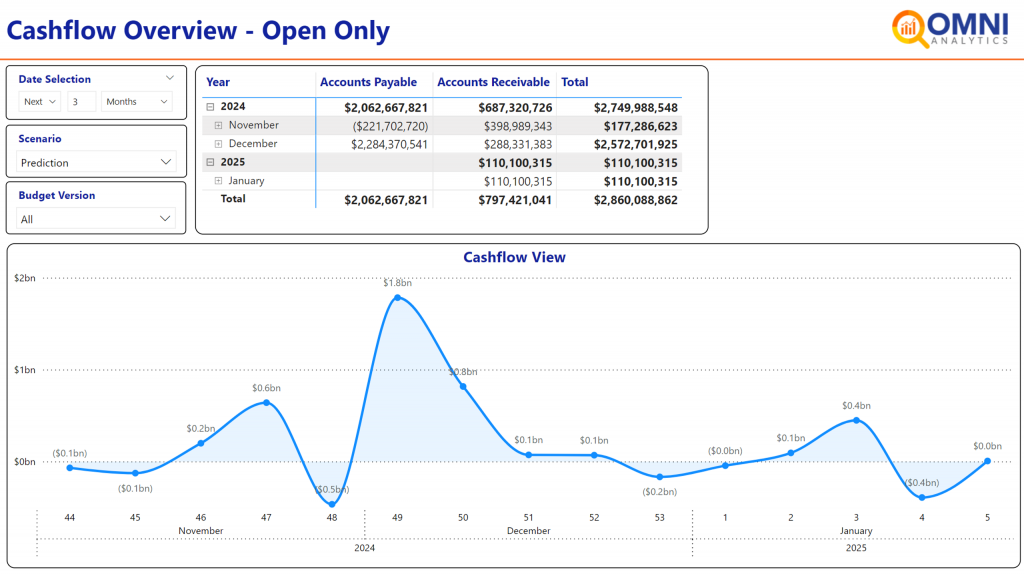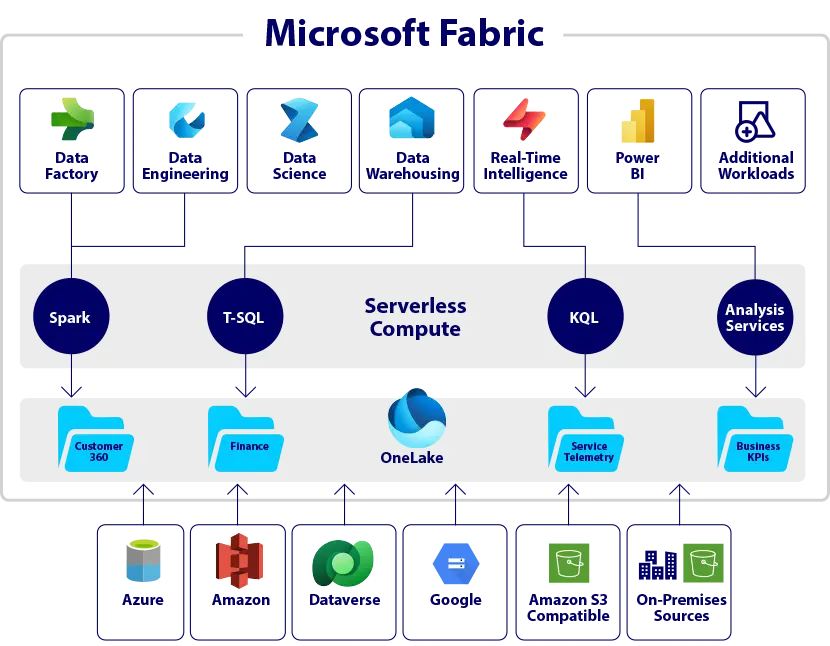
Summary
Virtual Supply is an award-winning distribution partner whose rapid growth outpaced its legacy reporting and analytics. Operating on Microsoft Dynamics 365 Finance & Supply Chain Management (D365 F&SCM), the company partnered with OmniData (now Fresche Solutions) to modernize its analytics infrastructure with OmniAnalytics. Over four transformative phases, Virtual Supply moved from limited D365 reporting to real-time insights, AI-driven cashflow forecasting, and a Microsoft Fabric architecture to accelerate decision making and support scalable growth.
- Time-to-Insight in Seconds: Order tracking visibility improved from 15–20 minutes to near real time.
- Real-Time Operational Visibility: Always-on Power BI dashboards across sales, inventory, and financials.
- AI-Enhanced Forecasting: 30–60 day cashflow projections informed by historical AR/AP patterns.
- Fabric-Ready Architecture: Migration to OmniAnalytics preserved customizations with zero data loss.
Headquartered in Beaverton, Oregon, Virtual Supply is a national distribution and fulfillment partner delivering strategic solutions for top manufacturers and leading retailers. The company specializes in end-to-end supply chain execution—from vendor onboarding and compliant EDI to pick-pack-ship fulfillment, inventory management, and performance reporting. With a diverse product catalog across major brands and multi-channel distribution (including marketplace and retail partners), Virtual Supply relies on accurate, real-time analytics to manage inventory turns, meet service-level agreements, and support growth at scale.
The Business Challenge: Legacy System Limitations
As Virtual Supply scaled, cracks started to show in day-to-day visibility. Leaders needed a clear picture of sales, inventory, and cashflow in the moment — not hours later. D365 F&SCM had the data, but turning it into timely, flexible insights took too much effort. The result was a lot of manual work, delayed answers, and decisions made without the full story. Here are some of the challenges they faced:
1. Limited Reporting Capabilities:
D365 F&SCM’s native reporting features couldn’t meet the company’s growing business intelligence needs, leaving decision-makers without real-time visibility into critical metrics. As Phil Bickler, VP of Operations at Virtual Supply, explains:
“The big glaring weakness once we went live was reporting. It wasn’t that there isn’t reporting built into Dynamics—it’s the ability to go in and customize it for the way your business operates.”
2. Complex Cashflow Management:
Diverse customer and vendor payment behaviors made forecasting difficult, hindering financial planning.
3. Technical Overhead:
Reliance on custom C# entities and BYOD (Bring Your Own Database) created high maintenance costs and operational inefficiencies.
4. Technology Shifts:
Microsoft’s deprecation of Export to Data Lake technology required a platform upgrade to maintain compatibility with evolving technologies.
The Solution: A Four-Phased Modernization Journey
To address these challenges, Virtual Supply partnered with Fresche to implement a comprehensive multi-phase modernization journey.
Phase 1: Foundation – OmniAnalytics Deployment
The first step was deploying OmniAnalytics, a purpose-built analytics platform for D365 F&SCM, to establish a strong foundation for data-driven decision-making. Key components included:
- Azure Data Lake integration for centralized data storage.
- Pre-built data models for Sales, Inventory, and Financials.
- Custom warehousing module for production reporting.
- Power BI dashboards for real-time insights.
These upgrades provided Virtual Supply with instant visibility into critical metrics and reduced time-to-insight from days to minutes. Here’s what the team had to say:
“We used to have about a 15–20 minute delay in visibility on order tracking dashboards. It is now literally within seconds. That kind of real-time information has been invaluable to us.”
— Phil Bickler, VP of Operations, Virtual Supply
“As a finance team, we know how we’re closing the month the minute the last order ships.”
— Emily Peterson, VP of Finance & Administration
Phase 2: Infrastructure Evolution – Data Source Migration
Virtual Supply was migrated to Microsoft’s Export to Data Lake technology, replacing the outdated BYOD approach. This phase included:
- Serverless architecture with Azure Functions for automated data processing.
- Multi-environment deployment to synchronize development, test, and production workflows.
- Comprehensive data validation protocols to ensure data integrity.
This migration enabled real-time data availability, reduced technical maintenance overhead, and eliminated dependencies on custom C# entities. Emily Peterson, VP of Finance & Administration, puts it this way:
“As the steward of more than $50 million in inventory at any given time, we rely on BI daily. We can see where inventory is, its age, inbound forecasts, and how those factors align—across on-site and off-site locations. That visibility helps manage obsolescence, accruals, and right-size inventory by warehouse.”
Phase 3: Intelligence Layer
Phase 3 added a critical intelligence layer that enabled expansion into two critical components: AI-power cashflow forecasting, and advanced sales reporting.
1. AI-Powered Cashflow Forecasting
Building on historical AR/AP patterns and seasonality, the team implemented an AI-driven forecasting model and scenario planning in Power BI. Forecast accuracy improved, and finance leaders gained a proactive way to test decisions before they impact the business.
According to Emily Peterson, cashflow was enlightening:
“The system learned our customers’ payment behaviors. For one major customer, it automatically adjusted for additional days added every fourth quarter based on history. We didn’t tell it to do that; it surfaced the pattern.”
Key features included:
- Predictive analytics powered by Databricks ML, incorporating historical AR and AP data.
- Advanced feature engineering to capture seasonality and payment patterns.
- Power BI-based scenario planning tools for testing various business scenarios.
“Our finance team has experienced significant time savings with this automated tool,” added Bickler. “This saves hours every month from manually gathering the information in spreadsheets to figure out cashflow.”

2. Business Critical Sales Reporting
Sales reports are some of the most utilized reports within the solution. Virtual Supply’s business with major retailers is heavily impacted by programs and promotions which have an effect on margins. The foundation provided by OmniAnalytics enabled Virtual Supply to build out its own custom sales reports to closely monitor margins and identify potential issues early.
Examples include:
- Custom Visuals to monitor sales versus forecasts at the customer and item level.
- Various reports to monitor returns from the retailers which allows Virtual Supply to provide data to vendors.
- Sharable reports for customers and vendor partners that also enable Virtual Supply to review business performance on a regular basis.
Phase 4: Future-Proofing – Microsoft Fabric Migration
To align with Microsoft’s latest technologies, Virtual Supply upgraded to OmniAnalytics Fabric Edition for enhanced data connectivity and preservation of existing customizations during migration.
This phase ensured a future-proofed analytics infrastructure with expanded capabilities and zero data loss. Emily Peterson notes:
“Fabric helps us react faster—we can’t hide from the numbers. If something trends the wrong way, we adjust purchasing, rebalance inventory, or move pricing to clear stock. And if a customer or brand isn’t viable, we can steer sooner.”

The Results: Transformative Business Impact
Virtual Supply’s data analytics modernization journey moved the team from delayed, manual reporting to a rhythm of real-time decisions and long-term success. What started as a push for better visibility became a durable operating system for the business. Measurable results include:
- Time-to-insight: 15–20 minutes down to seconds.
- Real-Time Visibility: Always-on Power BI dashboards across operations.
- AI-Driven Forecasting: Improved cashflow predictions with 30–60 day projections, enabling proactive financial management.
- Working Capital Optimization: Enhanced cashflow management and scenario planning tools improved financial efficiency.
- Future-Ready Scalability: Built a modern analytics platform aligned with Microsoft’s latest technologies, ensuring long-term compatibility and innovation.
- Business Continuity: Zero data loss during migration and seamless integration of existing customizations ensured uninterrupted operations.
After implementation, the first big win was speed. Dashboards that once lagged now refresh in seconds, shifting conversations from “what happened?” to “what do we do next?”
“With the dashboards we’ve built, we can now show our sales team that we’re only at 40% or 60% capacity, alleviating concerns and enabling them to pursue new opportunities.” Phil Bickler, VP of Operations
That real-time clarity gave sales confidence and helped operations balance load more intelligently.
Finance saw the same step-change in control. AI-enhanced cashflow forecasting learned customer payment behaviors and surfaced seasonal patterns, so leaders could act before issues emerged.
“The fact that we have a system we can put information in and then start to see if we go off that track and why — and just really react quicker to that… the whole thing makes my job a lot easier because when we get questions we go here first and usually we can get the answer.” – Emily Peterson, VP of Finance & Administration.
Quantified Impact:
- 91+ pre-built reports supporting cross-functional teams.
- Improved forecast accuracy from AI-driven models.
- Faster decision-making and strategic planning cycles.
Virtual Supply now runs on real-time insight instead of lagging reports — spotting capacity, steering working capital, and making faster, better decisions across the business. With a Fabric-ready foundation and AI-informed forecasting, the analytics stack doesn’t just describe the business; it helps run it.
As Emily Peterson put it: “If you have the data, it can do what you want it to. Fresche and OmniAnalytics were so helpful in making that happen. There hasn’t been much that we haven’t asked for that we didn’t get.”
That partnership—and the platform behind it—positions Virtual Supply to scale with clarity and confidence.


